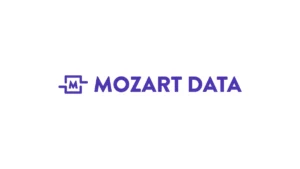You know data is important. No business leader wants their teams to be less data-driven. But many struggle with the decision to invest in the tools and personnel that enable data-driven operations. And with concerns about the state of the economy, that decision is only becoming more difficult.
At the time of publishing, inflation recently hit a 40-year high. U.S. consumer sentiment is approaching an 11-year low. There’s a notable slowdown in venture capital investment and valuations for companies at all stages have decreased.

But data doesn’t stop being important when the economy is struggling — if anything, an environment with more hesitance to spend and lend makes data even more important. Downturns have also historically proven to present opportunities for innovative companies to build.
So what’s the path forward? Finding a cost-effective way to make the most of your data.
Personnel is expensive
This isn’t a surprise to anyone, but it matters in this context. If you want to make the most of your data, you need the right people working with it. But, many of these positions are very expensive to fill.
The average data engineer or data scientist makes around $115,000 per year. Depending on the market you’re hiring in, it could cost you substantially more to land your ideal candidate — at Meta, the average total compensation for these roles is closer to $170,000 per year.
These data professionals can be immensely valuable for your organization, but they aren’t the only means to organizing data and spreading it throughout your organization. And, they still require the right data infrastructure in order to perform their work — the costs don’t cease once you’ve accounted for their payroll and benefits.
An out-of-the-box modern data stack is far more affordable
The out-of-the-box modern data stack empowers anyone to easily centralize, organize, and prepare their data for analysis without engineering resources. This type of data stack provides a SQL query editor and/or no-code tools that make it much easier for non-technical users to work with the data.
An out-of-the-box modern data stack is much cheaper than hiring data engineers or scientists. Mozart Data’s most popular plan costs $30,000 per year, but depending on customer needs there are cheaper and usage-based options. Assembling a technically similar data stack would cost 30% more, without including the tools that make Mozart’s modern data stack as user-friendly for data users of varying technical background.
Usage-based plans for the modern data stack give companies a great deal of flexibility to control their spend. Costs are determined by how much data is stored and the computation required when data is manipulated. Because of this, teams can be deliberate with their actions to control costs. Users can prioritize data projects that provide immediate ROI and work to make queries more efficient to save on compute costs.
The right data tools change your headcount needs
With a modern data stack, your personnel options are greatly expanded.
Many organizations find that a modern data stack allows their existing teams to utilize data. SQL isn’t a difficult skill to acquire, and those that are adept in Excel can typically pick it up in days. Your business intelligence (BI) tool also works much better when drawing from data organized in a warehouse, making analysis and visualization more efficient.
It’s not hypothetical — Zeplin’s growth marketing team started as the owner of their modern data stack. Modern Treasury’s product team led their data stack project and chose Mozart Data’s out-of-the-box modern data stack because they didn’t want to hire data engineers. Their teams could quickly begin using it without new headcount. Both companies eventually grew to the point that they wanted to add more data professionals, but they weren’t forced into headcount.
Assessing your options
We’re not telling you that data engineers and data scientists aren’t worth the money — for some organizations, hiring for these roles makes a lot of sense. Our own team has a number of engineers and experienced data professionals who make Mozart possible.
But, depending on your data infrastructure and the projects that impact your business, some of these roles aren’t essential headcount for your team right now. With the right technology, you can empower decision-makers to start accessing and using data to help you grow during a time when budget is tight.
Learn more about implementing a modern data stack here.

